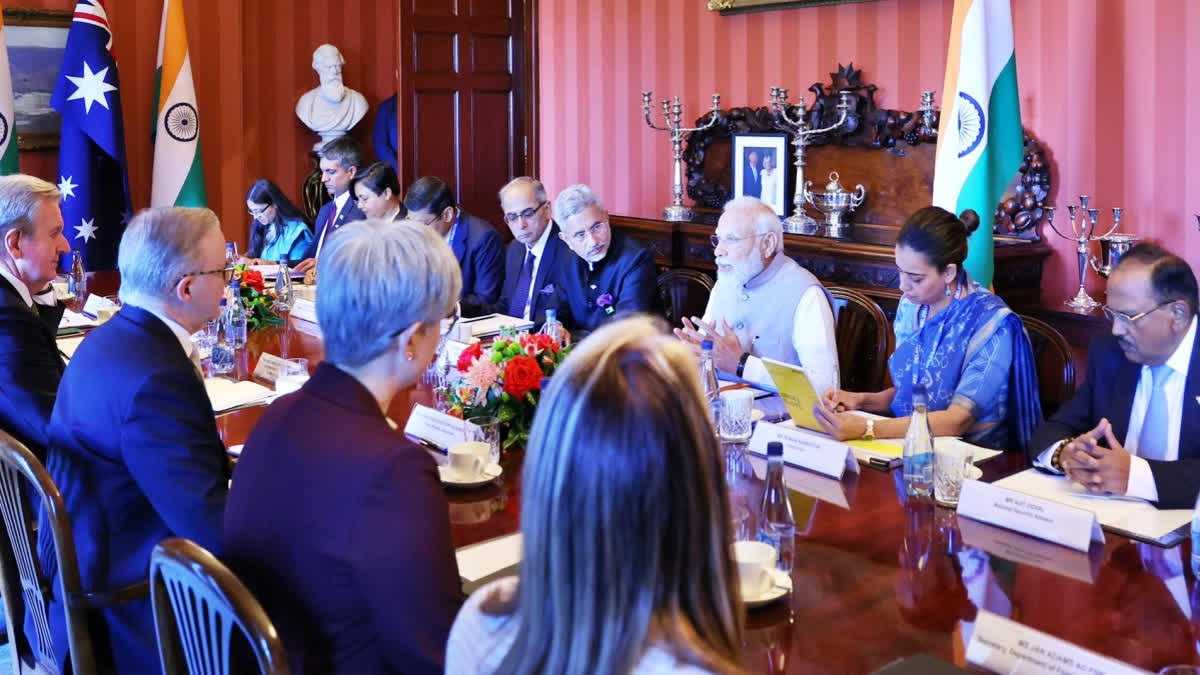Former diplomat Anil Trigunayat speaking to ETV Bharat's Chandrakala Choudhary New Delhi:Prime Minister Narendra Modi will complete nine years in power on May 30. If there is one aspect of governance that has seen a radical change in these years, it is the rejuvenated foreign policy which in turn has significantly improved India's global image while doubling up as a strong catalyst to manage the internal mood of the country.
To understand how India is placed internationally and what has changed in these nine years, ETV Bharat spoke to a few foreign policy experts all of whom agreed that India's position is far more robust than what it was at the beginning of the last decade.
“India's foreign policy has really transformed. It has become far more communicative and India is taking positions and sticking to those positions and also trying to convey and convince other nations regarding our position as was the case in the Russia-Ukraine war. Despite that, India remains as the major interlocutor for the Western countries, the US as well as for the East and has become the voice of the Global South," former diplomat Anil Trigunayat told ETV Bharat.
He said that India's position in the world during these nine years has been far more robust and her foreign policy has become far more resilient and result oriented. "A lot of credit goes to PM Modi's vision, his popularity and personal connections with leaders, which is visible virtually across the visits that he has been to 50 countries," Trigunayat said.
He pointed out that India as a country has kept up with its "DNA" 'Vaisudev Kutumbakam', a Sanskrit phrase that means "the world is one family". "We have shown that to the world. One of the most successful dimensions of India's foreign policy has been the policy towards West Asia. Initially, they were hesitant when PM Modi arrived on the scene in 2014 but he became the most decorated foreign leader in that part of the world," he added.
Observer Research Foundation (ORF) scholar and researcher Professor Harsh Pant said, "India has proposed solutions to global problems rather than simply criticizing the existing global order or trying to dismantle it the way, perhaps, China has tried to do. This requires some kind of 'diplomatic dexterity' that India's foreign policy has maintained it”.
Also read: 'Chaat', 'Jalebi', 'MasterChef' and a special evening: Top quotes from PM Modi's speech in Australia
Asked about India's rise in global affairs over nine years, Prof Pant said, “India's rise in global affairs today is taken as granted. India is one of the fastest-growing major economies; it has a stable political system, and effective governance at home and India can increasingly shape the global governance agenda. India's capability has increased and with that India's commitment to the global order has also increased. It is a fundamental shift in India's world view that India will have to contribute more and is contributing more to the global governance”.
"India is 1/6th of the world's population and now the challenges are with countries with smaller populations are facing tremendous difficulties. But India despite all the difficulties, has been able to not only bring itself up but have become the fastest growing economy in the world and has maintained democratic tradition in the country. India has become a strategic choice for everyone”, ex-ambassador Trigunayat further told ETV Bharat.
Over the years, India has maintained a rapport with all the major powers, despite the geopolitical challenges. The country shares one of the strongest strategic partnerships with Russia. India has been clear that its foreign policy will always remain independent especially when it comes to the Russia-Ukraine conflict. In fact, PM Modi has time and again made it clear to Russia's Vladimir Putin that this is not the time for war, yet cleared the import of Russian oil despite criticism from the West.
It is pertinent to note that in 2014, PM Modi visited Japan, and was his first visit outside India's neighbourhood. Since then, India struck a reputation with Japan and the relationship is getting even stronger. PM Modi was deeply saddened when his friend and former Japanese PM Shinzo Abe was assassinated in July last year. Modi went to Japan to attend the state funeral.
Further, pointing out the challenges for India's foreign policy, Professor Pant said, “The challenges in India's foreign policy are significant. First is the rise of China and we have already seen the kind of challenges China has posed to India in the last nine years. China is not willing to conceit the border issue in ways India wants. Therefore, the first and the biggest challenge for India is how to manage China's rise in the vicinity, in the global order because it is not only a bilateral issue but also a global issue that India has to contend with”.
Also read: Watch: Australian Super CEO says Impressed with PM Modi
